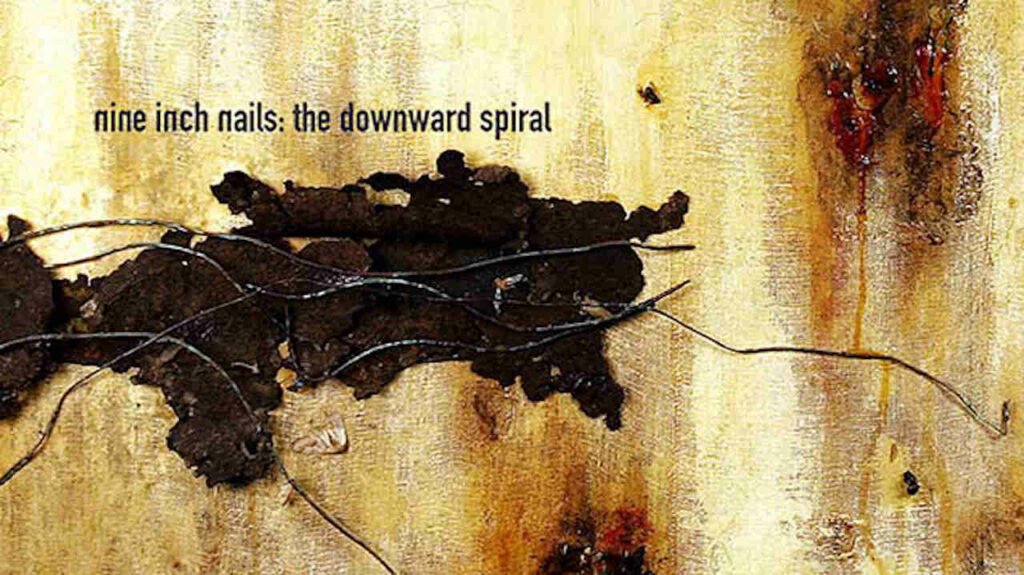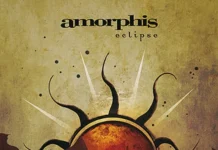I do not know much about astrology but I’m pretty sure the alignment of planets must have been of some kick-ass importance 30 years ago on Tuesday, March 8th, 1994. This particular date marked the release of two landmark albums, the ripples of which can still be felt all over the world – “Superunknown” by the Seattle grunge ambassadors, SOUNDGARDEN, and “The Downward Spiral” by NINE INCH NAILS. The latter is a concept album detailing a man’s unrelenting fall into the abyss, all the way down to his breaking point, and, released via Nothing Records in the United States and Island Records in Europe, it cemented this industrial-rock endeavor of Trent Reznor‘s as a reputable force, both commercially and artistically. The evolution of Reznor‘s signature sound from the industrially tinged synth-pop of NIN‘s 1989 debut “Pretty Hate Machine” to the diverse soundscapes of “The Downward Spiral” is quite breathtaking. The album was the heaviest and, lyrically, the most poignant effort that NIN had yet released. For me, it was the TV broadcast of the band’s legendary performance at the Woodstock ’94 festival that hit like a ton of bricks; then, hyped up by the show, I bought the album the very next business day to be completely blown away by its sheer emotional power. At the time of its release, its abrasive, darkly shaded, and eclectic sound was something out of this earth!

The downward spiral into darkness begins with a sample from the dystopian 1971 film, THX 1138. The sounds of a man being beaten by a prison guard fill the first few bars of the opening track, “Mr. Self Destruct,” the song released as a single already in 1993, foreshadowing the album’s dark and angry tone. Given Reznor‘s inclination toward dark synth-pop in his earlier endeavors, the title is very likely a reference to SOFT CELL‘s 1984 new-wave album “This Last Night in Sodom,” an album about self-destruction and the loss of innocence, opening with a track bearing the same name. This track also established guitarist Adrian Belew of KING CRIMSON fame (among myriad other projects) as Reznor‘s guest guitarist of choice. Belew‘s unusual, impressionistic, yet highly tasteful guitar textures were to adorn four further NIN albums over the next 19 years. He improvised the somewhat odd ending – the only instructions given to Belew upon the recording were something like, “See what happens. Don’t worry about it. Here’s the tape, do whatever you want. Go!”
At the time of its release, a great deal of the fuss about “The Downward Spiral” was centered around the fact that Reznor had moved to 10050 Cielo Drive, a house famous for having been the site of the gruesome Tate-LaBianca murders perpetrated by the “Manson family” in 1969. He had created a studio space there, calling it Le Pig, alluding to the word, “PIG,” written with Tate’s blood on the front door by the perpetrators, which itself was a reference to THE BEATLES song “Piggies” from their 1968 “White Album.” Released as a single in December 1994, the second track on this epochal 1990s endeavor, “Piggy,” is thus charged with myriad intertextual references. The original poem from which the song evolved into its slow-crushing splendor had been written in the wake of NIN‘s 1992 EP “Broken,” but no doubt the new studio environment with its dark history added a whole another layer of gloom. The leitmotif appearing throughout the album is first introduced in “Piggy,” played on the organ. Later, it appears on “Closer,” played on piano, and on the title track, played on acoustic guitar. Then, on “A Warm Place,” the acoustic guitar part appears reversed. Tricks such as these are something that David Bowie might have done – and surely did! – so, it is no wonder their later collaboration bore such brilliant fruit. Flying high on the back of “The Downward Spiral’s” success, Bowie and NIN teamed up for a joint North American tour in 1995, leading to further collaboration later. Now, if there ever were one double-whammy of a concert lineup that I would definitely go and see, given the ability to warp back in time, it would be this!
The lead single off the album, released in February 1994, was something a bit out of the ordinary. I mean, the industrial-rock paradigm with its heavy leanings toward the “four-to-the-floor” techno aesthetic has never really cared much for odd time signatures. “March of the Pigs” alternates between common time and septuple meter so that its basic meter could be thought of as one long measure of 29/8. Yeah, sure, some contemporary psybient acts today might mess around with quantum meters such as this, but this song is a high-energy punch-up – and 30 years ago, it was probably the first time, at least for me, to be straight-up punched in the face with a sonic fist to a delicious septuple beat. Needless to say, the prog nerd in me instantly approved of this banger. It is widely considered one of NIN‘s best songs and has been a staple of the band’s live performances.
“The Downward Spiral” is one of those albums that simply has no weak moments. Every track is a banger – yes, even the instrumental, ambient interlude, “A Warm Place.” Its haunting, sorrowful mood evokes Brian Eno‘s most memorable compositions and, while it isn’t driven by a frantic techno beat, it sure does get under your skin. However, amidst all the ear candy, there is one track that can be considered one of Reznor‘s signature songs – the sonic paradigm of NINE INCH NAILS. “Closer” is the song that instantly springs to mind upon seeing even the stylized logo of the band. Due to the sexually explicit chorus, the song has been misinterpreted as an anthem of lust, although, if you really listened to the lyrics, it should be quite obvious that the actual theme has far more to do with self-hatred and obsession. Well, either way, the song is a picture-perfect specimen of class-A industrial rock.
I guess it would be an easy thing to do to write a tome about this album, so I’ll fast-forward to the epic closer. Among the in-between tracks, “I Do Not Want This” has been one of my go-to tracks since day one for its haunting mood. Then, “Big Man with a Gun” was caught up in controversy, following the Columbine Massacre, with the incident, once again, proving that a disturbed mind can interpret art in whichever way they find the most favorable for their cause.
The album closes with nothing short of a bone-chilling track. Given the conceptual nature of the album, “Hurt” could be interpreted either as a suicide note of the song’s protagonist or, conversely, a statement of hope in the face of depression and pain. Be as it may, the song’s raw sincerity sure gives you goosebumps. Yet, the 2002 cover version by Johnny Cash hit even harder. Reznor himself has praised this later interpretation of the song, going so far as to say, “That song isn’t mine anymore.” If there is one song that can leave you just as devastated as a heart-wrenching feature film, it is this one, either the 1994 original or the Johnny Cash rendition.
Perhaps recording this album in a vintage crime scene did open some inter-dimensional, dark portal because – let’s face it! – “The Downward Spiral” has aged remarkably well; it sounds every bit as timeless as it did 30 years ago. It was ahead of the curve just enough to become a huge commercial success – reaching out too far ahead into the future usually does not fare well for the artists, remember. I guess it paved the way for the further amalgamation of the hard-NRG techno aesthetic and rock’n’roll, which gave us “Firestarter” by THE PRODIGY, for instance, a few years later. And for that, we shall be forever grateful.
Written by Jani Lehtinen
Tracklist
- Mr Self Destruct
- Piggy
- Heresy
- March of the Pig
- Closer
- Ruiner
- The Becoming
- I Do Not Want This
- Big Man With a Gun
- A Warm Place
- Eraser
- Reptile
- The Downward Spiral
- Hurt
Lineup
Trent Reznor – vocals, all instruments except where noted
Mark “Flood” Ellis – production, ARP 2600 synth on “The Becoming”
Chris Vrenna – drums on “Hurt,” programming, sampling
Adrian Belew – guitar textures on “Mr Self Destruct”
Danny Lohner – additional guitar on “Big Man With a Gun”
Andy Kubiszewski – drums on “The Downward Spiral”
Stephen Perkins – drum loops on “I Do Not Want This”
Charlie Clouser – programming
Label
Nothing Records / Island Records





